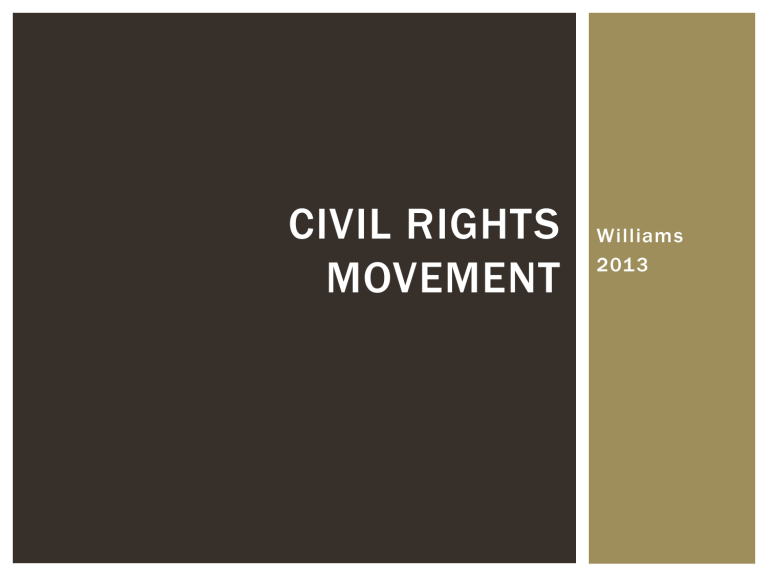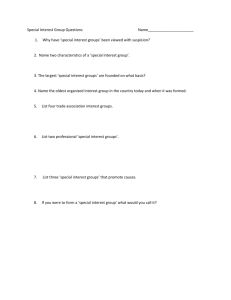Civil Rights Movement - Arizona School for the Arts

CIVIL RIGHTS
MOVEMENT
Williams
2013
“SEPARATE BUT EQUAL”
“SEPARATE BUT EQUAL”
Emancipation Proclamation (1863):
President Abraham Lincoln
Declared the freedom of black slaves in Confederate states
American Civil War (1861 – 1865)
Jim Crow Laws (1880s – 1960s):
Names after black-face character from minstrel show in
1930s-40s
Laws that enforced racial segregation.
Laws varied from state to state or even city to city
Intermarriage: The marriage of a person of
Caucasian blood with a Negro, Mongolian,
Malay, or Hindu shall be null and void. Arizona
The schools for white children and the schools for negro children shall be conducted separately. Florida
Books shall not be interchangeable between the white and colored schools, but shall continue to be used by the race first using them. North Carolina
It shall be unlawful for any amateur white baseball team to play baseball on any vacant lot or baseball diamond within two blocks of a playground devoted to the Negro race, and it shall be unlawful for any amateur colored baseball team to play on any vacant low or baseball diamond within two block of any playground devoted to the white race. Georgia
“SEPARATE
BUT EQUAL”
Jim Crow
Laws
(1880s –
1960s)
“SEPARATE BUT EQUAL”
Plessy v. Ferguson (1896)
Homer Plessy jailed in 1892 for sitting in the “white” section of the East Louisiana Railroad.
Argued that the Separate Car Act violated the Thirteenth and
Fourteenth Amendments to the Constitution
Supreme Court upheld the guilty verdict against Plessy
Set the precedent for “separate” facilities for blacks and whites as constitutionally valid as long as they were “equal”
“SEPARATE BUT EQUAL”
Constitutional PAUSE!!!
13 th Amendment: Neither slavery nor involuntary servitude, except as a punishment for crime whereof the party shall have been duly convicted, shall exist within the United States, or any place subject to their jurisdiction.
14 th Amendment: All persons born or naturalized in the United
States, and subject to the jurisdiction thereof, are citizens of the United States and of the state wherein they reside. No state shall make or enforce any law which shall abridge the privileges or immunities of citizens of the United States; nor shall any state deprive any person of life, liberty, or property, without due process of law; nor deny any person within its jurisdiction the equal protection of the laws
“SEPARATE
BUT EQUAL”
Brown v. Bo ar d o f E ducation
To peka, Kansas
“SEPARATE BUT EQUAL”
Montgomery Bus Boycott
December 1 , 1955: Rosa Parks arrested for refusing to give up her bus seat to a white man.
A city wide boycott was planned and organized, in par t by Dr. King, for the following Monday.
Pressure to end the boycott was intense – from politicians, white business owner s, and government ef for ts.
The U.S. Supreme Cour t declared the segregation unconstitutional under the 14 th Amendment.
The boycott lasted until December
21 , 1956.
Rosa Parks
“SEPARATE
BUT EQUAL”
Li t tle Ro c k
Ni ne (1 9 57 )
“SEPARATE
BUT EQUAL”
Ruby Br i dges
(1 9 6 0 )
“SEPARATE
BUT EQUAL”
Jam es M er edith
& Ol e M i ss
(1 9 6 2 )
“SEPARATE
BUT EQUAL”
U ni ver sity o f
A l abama
(1 9 6 3 )
INCREASING HOSTILITY
INCREASING HOSTILITY
Murder of Emmitt Till
(1955):
14-year-old boy from Chicago visited relatives in Mississippi
Followed a dared by peers to address a white woman in a store
Two men, both related to the woman in the store, came to the cabin where Emmitt was staying and took him away in their truck
Emmitt’s body was found three days later in the river. His head was shot and crushed in. His body was nearly unrecognizable.
The defendants were found notguilty.
INCREASING HOSTILITY
1955: Reverend George Lee, Vice President of the Regional
Council of Negro Leadership and NAACP worker, was shot in the face and killed for urging blacks in the Mississippi Delta to vote. No one was charged and Governor Hugh White refused to investigate.
1961: Herbert Lee was shot and killed in Liberty, Mississippi, by E.H. Hurst, a member of the Mississippi State Legislature.
Hurst targeted Lee for his involvement with a voter registration campaign. Despite multiple eyewitnesses, Hurst was never charged.
1963: NAACP State Director Medgar Evers was gunned down in his Jackson driveway by White Citizens Council member
Byron De La Beckwith from Greenwood, Mississippi.
INCREASING HOSTILITY
1966: James Meredith is shot by a sniper after beginning a lone civil rights march from
Memphis to Jackson.
He called his journey the
“March Against Fear”. The march was intended to encourage voter registration by
African Americans in the
South.
Martin Luther King, Jr., and
Stokely Carmichael, leader of the Student Nonviolent
Coordinating Committee, arrived to continue the march on Meredith’s behalf.
The shooter, Aubrey Nor vell, confessed and was found guilty. He only ser ved 18 months of his five year sentence.
INCREASING HOSTILITY
Freedom Summer (1964):
Civil rights activists James
Chaney, Andrew Goodman, and
Michael Schwerner left their base in Meridian, Mississippi, to invetigate a church burning at the Mount Zion Church.
The men were stopped by a
County Deputy Sheriff, Cecil
Price, released after several hours, and then detained again.
Price turned the men over to his fellow Klansmen who beat and shot the men to death.
Seven Klansmen, including
Sheriff Price, were charged.
They were all found not guilty.
INCREASING HOSTILITY
“Nonviolence is the answer to the crucial political and moral questions of our time…”
Dr. Mar tin Luther King, Jr.
“…any black man who teaches black people to turn the other cheek and suf fer peacefully af ter they’ve been turning the cheek and suf fering peacefully for 400 year s…he is doing those people an injustice and he’s a traitor to his own people.”
Malcolm X
AN ORGANIZED RESPONSE
AN ORGANIZED RESPONSE
NAACP: National Association for the Advancement of Colored
People
Founded in 1909 by W.E.B. Du Bois and several white northerners that sought to achieve legal victories for African Americans, especially the reversal of “separate but equal”.
SCLC: Southern Christian Leadership Conference
Coalition founded in 1957 by Martin Luther King, Jr. and nearly one hundred other southern ministers to rally church support for the growing civil rights movement. Sought integration through “love and nonviolence”.
SNCC: Student Nonviolent Coordinating Committee
Founded in 1960 after the Greensboro sit-in. Goal was to organize students on campuses across the country. Participated in nearly every major peaceful campaign of the civil rights movement.
CORE: Congress of Racial Equality
Founded in 1942 to campaign against segregation in the North using sit ins and other nonviolent forms of protest. Worked closely with SNCC, the
SCLC, and the NAACP.
AN ORGANIZED RESPONSE
NUL: National Urban League
Nonpartisan civil rights organization founded in 1910 that advocates on behalf of African Americans and against racial discrimination.
BLACK PANTHERS:
Organization of militant black civil rights activists inspired by Stokley
Carmichael’s “black power” philosophies. Founded in California in
1966. Advocated the use of violence to incite a racial revolution in the United States. Helped poor residents in black communities by running clinics and schools.
NATION OF ISLAM:
Group founded in 1930 to promote black nationalism in Detroit’s black community during the Great Depression. Malcolm X emerged as the organization’s chief spokesman in the early 1950s.
AN ORGANIZED RESPONSE
SIT-INS
February 1, 1960: Four African
American college students walked into a Woolworth’s in
Greensboro, North Carolina, and were refused service. They sat down and refused to move.
Day 2: more than twenty African
American students came to the store to join the sit-in.
Day 3: Sixty people joined.
Day 4: More than 300
On July 25, 1960 black employees of the Greensboro’s
Woolworth’s store were the first to be served at the store’s lunch counter.
The next day the entire Woolworth’s chain was desegregated.
AN ORGANIZED RESPONSE
MARCHES
200,000 people from all across the U.S. met in
Washington, D.C., in
1963 to promote action on civil rights issues.
The “March on
Washington” was supported by the NUL,
NAACP, CORE, SCLC, and
SNCC
A peaceful march that culminated in the delivery of “I Have a Dream” by
Dr. Martin Luther King, Jr.
AN ORGANIZED RESPONSE
STRIKES
FEBRUARY 1, 1968: Two black sanitation workers were crushed to death when the compactor mechanism of the trash truck was accidentally triggered.
On the same day, 22 black workers were sent home for the day while their white counterparts were kept on with pay.
February 12, 1968: 1,100 of a possible 1,300 black sanitation workers began a strike for job safety, better wages and benefits, and union recognition.
LANDMARK VICTORIES
LANDMARK VICTORIES
Civil Rights Act of 1957: Nominally outlawed racial segregation and created a civil rights division within the Justice Depar tment. More symbolic than legally significant.
Civil Rights Act of 1964: Outlawed discrimination in public places and the workplace on the basis of race, religion, nationality, or gender. Also created the Equal Employment Oppor tunity Commission to ensure that people would abide by the law.
Voting Rights Act of 1965: Outlawed literacy tests as a voting prerequisite and sent federal election of ficials into the South to help blacks register to vote. Some historians claim that its passing marked the true end of Reconstruction.
Interracial Marriage: June 12, 1967, the U.S. Supreme Cour t voted unanimously to over turn the conviction of Richard and Mildred Loving, a young interracial couple from rural Caroline County, VA .




